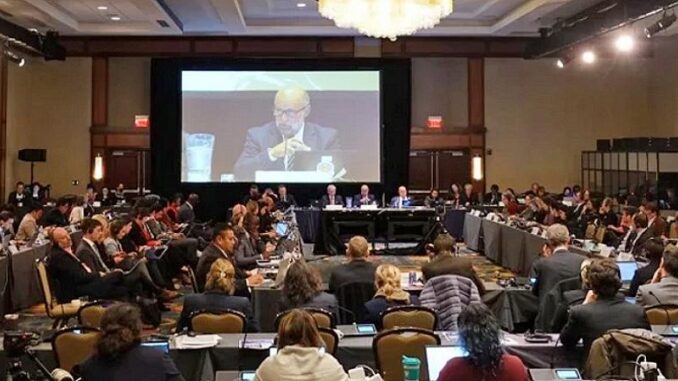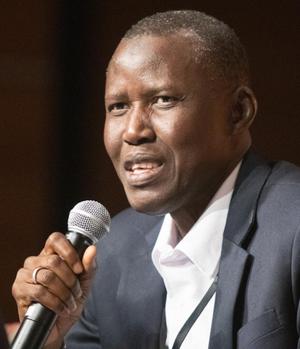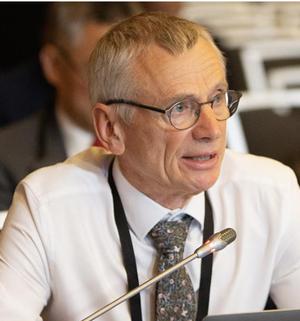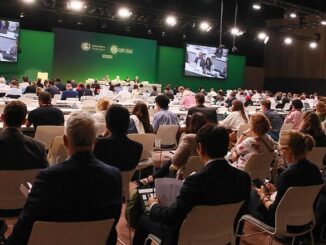
WASHINGTON, DC, February 9, 2024 (ENS) – The Global Environment Facility’s 186 member governments have agreed to invest $1.1 billion for international action on biodiversity, climate change, nature renewal, and pollution control, during the GEF’s first meeting as the Council of the new Global Biodiversity Framework Fund, GBFF.
The GEF Council, meeting in Washington, DC, approved $918 million for 45 projects and programs from the Global Environment Facility Trust Fund, including four blended finance initiatives involving the private sector and five Integrated programs designed to tackle complex challenges in their entirety.
Government representatives also endorsed $203 million for 21 climate change adaptation projects funded by the Least Developed Countries Fund, LDCF, and Special Climate Change Fund, SCCF.
These two funds are part of a family of funds that also includes the GEF Trust Fund, the Nagoya Protocol Implementation Fund, and the Capacity Building Initiative for Transparency Trust Fund.
The GBFF, the latest addition to this growing portfolio housed within the Global Environment Facility, is expected to start funding projects related to nature loss and restoration by the end of 2024.

Dawda Badgie, executive director of the National Environment Agency of The Gambia and co-chair of the GEF Council, welcomed the agreement among countries to jointly address environmental issues that directly affect human well-being everywhere.
“These decisions can change peoples’ lives for years to come,” Badgie said, citing the agreed support for coastal resilience and women’s livelihoods. “We have to act collectively about the challenges we are facing. They do not spare anybody.”
The new Global Biodiversity Framework Fund was launched at the GEF Assembly in August 2023, less than a year after parties to the UN Convention on Biological Diversity requested that the GEF create it to help countries meet the Kunming-Montreal Global Biodiversity Framework goals on halting and reversing nature loss.
Country representatives meeting as the GBFF Council reached agreement in Washington on how donor resources will be allocated, and how projects will be designed and approved.
During the Council meeting, Spain announced a new contribution to the GBFF, adding to previous contributions announced by Canada, the United Kingdom, Germany, and Japan.
The GEF is the only multilateral environmental fund that is mandated to work across an array of challenges including biodiversity, climate change, desertification, and toxic chemicals including mercury.
The work program approveed this week – the second-largest in the GEF’s history – includes $530 million for Integrated Programs for the ocean, food systems, transportation infrastructure, wildlife conservation, and critical forest biomes that have been designed to break down silos and advance holistic action across sectors and borders.
“To achieve impact that lasts, we need to work in an integrated and inclusive way,” said GEF CEO and Chairperson Carlos Manuel Rodríguez. “The GEF is moving quickly and efficiently to target donor contributions to urgent needs. We also recognize that financing alone cannot reverse environmental degradation for the long term. This work program therefore stands out not only for its size but also for its focus on a whole-of-society approach to phasing out harmful practices.”
The GEF Trust Fund work program is set to mobilize $7.5 billion in co-financing, including from bilateral governments and multilateral development banks. It spans 77 countries including 22 Least Developed Countries and 14 Small Island Developing States, with the largest regional shares of the funding package going to Africa and Asia.
Funding the High Seas Treaty
The GEF was selected last year to be a part of the financial mechanism to the new High Seas Treaty on Biodiversity in areas Beyond National Jurisdiction, BBNJ.
A paper approved by the Council outlined initial guidelines for GEF support related to the High Seas Treaty, which will complement and build on both international waters and biodiversity investments. Support will include funding for enabling activities and ratification support that will help countries move forward quickly to enact the new agreement.
“We are conscious of our unique role in environmental finance, and are committed to achieving lasting positive impacts by working in an integrated and inclusive way. The investments and plans approved by our member governments this week reflect this determined commitment,” said Carlos Manuel Rodríguez, GEF CEO and Chairperson.
“The support the GEF is deploying stands out not only for its size and accelerating speed, but also its reach. We are breaking down silos to move the needle on the environmental challenges both donor and recipient countries are facing,” Rodriguez said.
The GEF Trust Fund work program – the second-largest in the multilateral institution’s history – is set to mobilize $7.5 billion in co-financing, including from bilateral government aid and multilateral development banks. It includes $530 million for Integrated Programs for the ocean, food systems, transportation infrastructure, wildlife conservation, and critical forest biomes that have been designed to advance holistic action across sectors and borders.
The approved projects and programs will contribute to global environment benefits across the board, with boosts for protected areas, landscape management, greenhouse gas emissions reduction, and terrestrial and marine ecosystems. They span 77 countries including 22 Least Developed Countries and 14 Small Island Developing States.
While most of the GEF Trust Fund support will be provided as grants, the work program also includes $81 million for four blended finance projects that are set to mobilize $1.36 billion in outside investment.
In addition to approving funding for the new projects and programs, GEF Council members received updates from the GEF Scientific and Technical Advisory Panel and from the Independent Evaluation Office.
The Council of the Least Developed Countries Fund, LDCF, and Special Climate Change Fund, SCCF, agreed to fund 21 projects that build on years of support for critical initiatives that are helping countries address their most urgent adaptation priorities in a way that helps local communities, strengthens policy frameworks, and advances environmental goals for the long term.
One of the largest work programs in the more than two-decade history of the LDCF and SCCF, the funding comes two months after nine donor governments announced new contributions to the unique climate adaptation funds at the UN Framework Convention on Climate Change COP28 in Dubai.
Since the 2015 Paris Agreement, the GEF has been mobilizing and distributing resources to meet the urgent and specific climate adaptation needs of Least Developed Countries, Small Island Developing States, and other developing countries, following guidance and decisions from parties to the UN climate convention.

Speaking at the Washington, DC meeting, Acting Executive Secretary of the Convention on Biological Diversity David Cooper stressed the need for Indigenous Peoples, local communities, women, and youth to be involved in the fund to work towards that 20 percent allocation. “Your contributions to this process are going to be very important,” Cooper told the delegates.
All GEF-supported projects and programs include an overt gender emphasis as required in the institution’s policies and guidance. Incorporating gender perspectives in project planning, working to ensure that women’s needs and potential contributions are taken into account, and that women benefit from work undertaken and can access related finance and other resources are all part of the GEF’s policy.
Women, women’s groups, and gender experts are key stakeholders in project and program design and assessment.
Inclusive conservation, including in partnership with Indigenous Peoples and local communities, women, and youth, is prioritized throughout GEF policies and procedures, and as guiding principle for the funding it provides.
In the case of the GBFF, up to 20 percent of the new fund’s resources “will aim to support Indigenous-led initiatives to protect and conserve biodiversity,” the GEF said in a statement.
Featured image: Global Environment Facility meets in Washington, DC, February 5, 2024 (Photo courtesy GEF)



